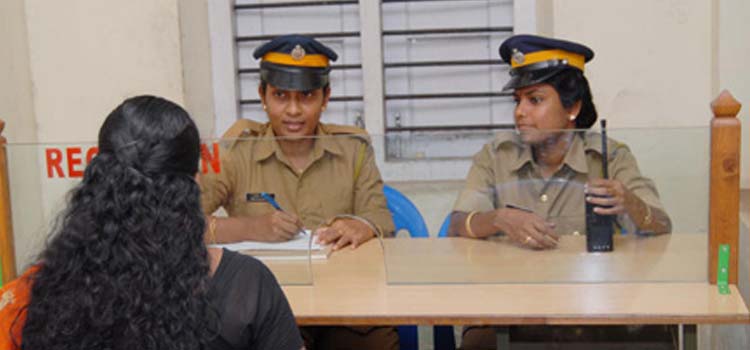How To File A Police Complaint? - Know Here
Posted On : May 6, 2022

Table of Contents
If you breach my rights, I will complain to the police. But how to file a police complaint? Bragging about taking a legal action against the other is like snapping the fingers. But understanding the procedures established by law is like biting a bullet. However, the police complaint process in India is not that much of a troublesome task. The actual journey starts with what happens after police complaint is registered. Know how to file online police complaint and relative modes in India.
How to File a Police Complaint?
When it comes to legal matters, things are a bit complicated for which people need criminal lawyers to explain and decode the information. However, a police complaint is something which needs quick redressal or action by the proclaimed saviours of civilians. That is why the police complaint process is kept simple and straight. Know how to file a police complaint with the help of step by step guide below:
- Visit the nearest police station whereby crime is committed;
- Contact the officer in charge of the police station;
- Explain the events that took place, whatever is in your knowledge;
- In case of a cognizable offence as per the facts revealed, the officer in charge will note it down in the diary[1] maintained by the police station;
- Complainant may also reach out the nearest police station with a written complaint;
- The FIR[2] will be registered and a copy of the same will be given to the complainant;
- A police complaint number will also be communicated to the complainant by said police officer;
- Even if you are away from or unaware of the location of the crime scene, reach out to the nearest police station for registration of zero FIR;
- If a police complaint is reported through modes other than physical visit to the police station, it is still a police complaint and has to be registered by the concerned officials if the contents of the facts reveal cognizable offences.
Online Police Complaint
Police departments in India are divided among the states and union territories based on which jurisdiction is divided. Police complaint process may also vary for such territorial jurisdictions, however ultimate compliance with the Code of Criminal Procedure, 1973 is a must for all. Some states in India have provisions for online police complaints. Haryana, Delhi, Madhya Pradesh are some of the many states in India having a web portal for online police complaints in India. Apart from that, social media is another renowned platform for communicating complaints to the police officials. One may also resort to Twitter, Facebook pages of the state/ local police and communicate their complaint.
How to File a Police Complaint Online?
The complainant may not be able to be physically available to visit the police station. For such emergency cases when it is not feasible to go physically, delay in reporting can be prevented through online police complaint process as shown below:
- Search for an online portal for the state/ union territory where a police complaint has to be lodged.
- Visit the online police complaint portal.
- Click on the link on ‘how to file a police complaint?’.
- Follow the instructions provided and reveal all the necessary details.
- Note the online police complaint number which appears at the end of the online police complaint process.
- On the same website, one may also find the link to check online police complaint status.
Who can File a Police Complaint?
A police complaint can be filed by anyone who has knowledge of the offence committed. It can be the victim of such offence, his or her relatives, friends, or any witness of the incident. While making a police complaint, all the events which the complainant has knowledge of or is sure about should be reported. Knowledge of the applicable legal provisions is not the duty of the complainant. However, knowledge of facts of the matter is crucial.
What if Police Denies Complaint Registration?
Whenever any cognizable offence happens, filing a police complaint is a must and it is the duty of the police officer in charge to lodge an FIR in this regard. If you know that an offence is cognizable as per the law and the police officer still rejects registration of FIR, the following steps can be taken:
- Write an online police complaint (if such state has such portal), or
- Make a written complaint and send the same via post to the said police station, or
- Use the email address of the said police station available for public convenience, or
- Write a police complaint to the Superintendent of Police of the area, or
- Use social media platform registered in the name of such state/ local police, or
- Resort to the judiciary who may force the officials to register an FIR.
How to File a Police Complaint Against an Officer?
In case a public servant is asking for money to do what he is obligated to do as per his duty, it is a bribe and a complaint can be lodged as per the provisions of Prevention of Corruption Act, 1988. If the local police do not register a police complaint or no action is being taken, the Central Bureau of Investigation can also be approached. Complaints to CBI may be made directly and may require consent of both central and the concerned state governments. Apart from corruption, other kinds of misconduct are also restricted by the said police officers. In some states, there is a district wise establishment of the Police Complaints Authority which deals with such matters. They provide a specific process to be followed by complainants. The outcome of such complaints may be suspension, termination or even imprisonment if charges are proved against such police officers.
Police Complaint and Significance of Time
In India, the criminal offences, especially the serious - cognizable ones have to be reported to the police without any delay. The FIR so registered is a document which may be argued upon during the trial before court of law. An unexplained delay in filing a police complaint sometimes weakens the case of prosecution. Thus, as soon as possible, file a police complaint if you know the act committed is a cognizable offence. If you are in Kolkata and need to hire a lawyer for a case, consultation with a criminal advocate in Kolkata is recommended.
What Happens After Police Complaint is Made?
After a police complaint is reported, the police officer looks into the contents of the complaint whether there are some facts depicting the commitment of a cognizable offence. If that is the case, a first information report has to be registered after which, investigation of the crime begins. However, in case the facts reveal non-cognizable offence, he may refer the same to Magistrate[3]. However, if there is a doubt on whether the actual act may be a cognizable or non-cognizable offence, preliminary investigation may take place.
[1] Section 172 of the Code of Criminal Procedure, 1973.
[2] Section 154 of the Code of Criminal Procedure, 1973.
[3] Section 155 (2) of the Code of Criminal Procedure, 1973.





















